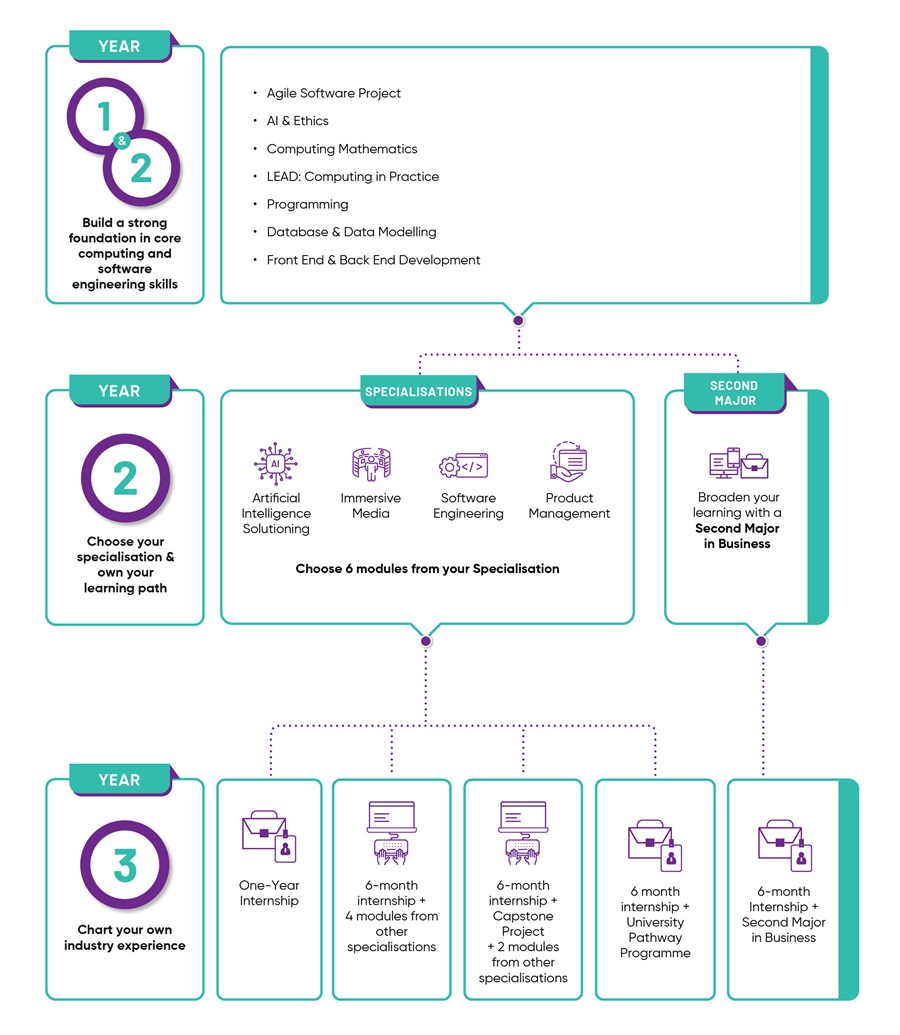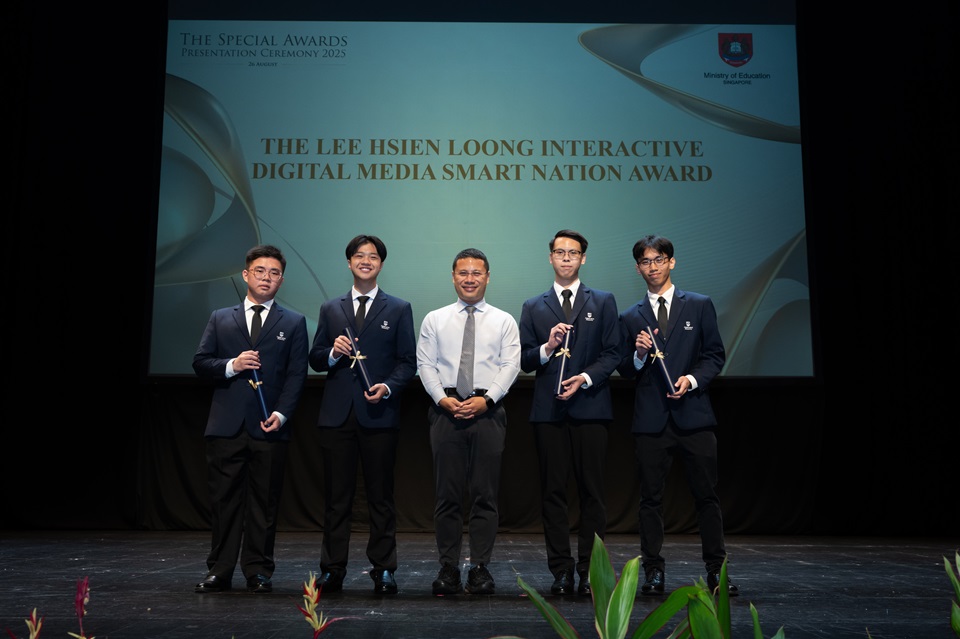Why IT?
- Build a strong foundation in computing and software engineering for wide-ranging careers
- Four exciting specialisations: AI Solutioning, Immersive Media, Product Management and Software Engineering
- Deepen skill sets with one-year internship programmes such as the OCBC-NP Technology Young Talent Programme
- Earn professional industry certifications from renowned organisations such as IBM, AWS and SalesForce
- Unlock new opportunities for your career and further studies with a Second Major in Business
- Passed GCE O-Level Computing? Save up to 75 curriculum hours! New!
About IT
Dive into the world of technology with our Diploma in Information Technology (IT). This comprehensive course will equip you with the essential skills and knowledge needed for today’s tech-driven industries.
With a strong foundation in programming, networking, databases and operating systems, you will be prepared for further studies or careers in fields such as artificial intelligence, immersive media, product management, and software engineering.
Beyond learning how to use AI technologies, you will gain skills to create and evaluate solutions generated by AI tools. Designed to enable you to effectively integrate AI-generated solutions, you'll build confidence to innovate with AI.
Plus, there will be platform for you to experiment with and apply GenAI approaches to push the boundaries of AI-driven systems!
Design your learning by choosing modules that best match your interests and strengths. Alongside core modules such as programming, our flexible curriculum structure allows you to specialise in at least one of these four areas:
- Artificial Intelligence Solutioning
- Immersive Media
- Product Management
- Software Engineering
Alternatively, opt for up to ten electives to broaden your skills. With our extensive range of electives, you can explore technologies like cloud computing, computer vision, DevOps, Immersive technologies, machine learning, natural language processing, and software architecture.
Get a competitive edge by pursuing a Second Major in Business! This dual qualification will unlock new opportunities for your career and further studies.
Fast-track your university journey with the NP-SMU University Pathway Programme and the Poly STUD Scholars Programme! These programmes let you take university modules during your diploma studies. For the SMU Pathway, you’ll gain advanced placement in their Information Systems and Computing Science
programmes. Meanwhile, the SUTD programme allows you to explore humanities and science modules that count towards your degree at SUTD.
Build your digital portfolio with a capstone project to showcase your skills to potential employers.
Advance your career with additional professional certifications, such as Certified Scrum Master, AWS Certified Cloud Practitioner, Salesforce ADX 201 Certification, UiPath Certified RPA Associate
Many modules are co-designed and co-delivered with our industry partners such as GovTech, IBM, AWS, NCS Group, and Dell Technologies, ensuring you are well-prepared for the industry.
You can experience innovative programmes that take you out of the classroom. Enrich your learning journey with industry visits, overseas exchange programmes to Shanghai, Shenzhen and Ho Chi Minh City, and get to pursue a one-year internship or tackle real-world problem statements with industry mentorships.
Passed GCE O-Level Computing? Enjoy an automatic exemption from Programming Fundamentals – giving you more time to take on projects, certifications and competitions.
Overview of Your IT Journey

Highlights
Smart Nation Award Recipient
Dell InnovateFest Champs
Reaching Greater Heights
Inspiring Through Technology
Further Studies
You can receive advanced standing when you apply for related degree programmes at universities both locally and abroad. These include:
Singapore
- Nanyang Technological University
- National University of Singapore
- Singapore Institute of Technology
- Singapore Management University
- Singapore University of Technology and Design
Australia
- Australian National University
- University of Adelaide
- University of Melbourne
- University of New South Wales
- University of Queensland
- University of Western Australia
Careers
With our course skills aligned to the ICT Skills Framework, you can look forward to pursuing careers in these roles:
- Applications Developer
- Back-End Developer
- Channel Sales Executive
- Cloud Engineer
- Customer Experience Manager
- Database Administrator
- Data Analyst
- Data Engineer
- Front-End Developer
- Full Stack Developer
- Infrastructure Executive
- Platform Engineer
- Sales Consultant
- Systems Analyst
- Technical Support Executive
Entry Requirements
AGGREGATE TYPE ELR2B2-C
To be eligible for consideration, candidates must have the following GCE ‘O’ Level examination (or equivalent) results.
| Subject | 'O' Level Grade |
|---|---|
| English Language | 1-7 |
| Additional Mathematics/Mathematics | 1-6 |
| Any one of the 2nd group of Relevant Subjects for the ELR2B2-C Aggregate Type | 1-6 |
Applicants must also fulfil the aggregate computation requirements for the ELR2B2-C Aggregate Type ( English Language, 2 relevant subjects and 2 other best subjects) listed at www.np.edu.sg/docs/ELR2B2.pdf.
For students with other qualifications, please refer to the NP website for the entry requirements and admissions exercise period.
Candidates with severe vision deficiency may encounter difficulties meeting the course requirements and expectations.
What You Will Learn
Year 1
LEAD: Computing in Practice (4 Credit Units)
This module provides a foundation understanding of how Legal Technology, Software Engineering, Data Analytics and Cybersecurity interrelate and contribute to digital transformation across industry. It aims to strengthen students' appreciation of the ethical, legal and professional dimensions of technology and its role in shaping responsible innovation.
Students will engage in thematic clusters that explore topics such a data analytics, cybersecurity awareness, digital governance and emerging technologies. Each cluster incorporates experiential learning through applied projects, industry talks and site visits that promote a practical understanding of computing in context. By the end of the module, students will have developed a holistic understanding of the ICT landscape and its applications in real-world practice.
AI & Ethics (2 Credit Units)
This module introduces students to the foundational concepts of Artificial Intelligence (AI) and the ethical challenges that arise in its design, development, and deployment. Students will explore how AI technologies impact individuals, organizations, and society at large.
Through a blend of theoretical frameworks and practical case studies, students will critically examine key ethical principles including fairness, accountability, transparency, privacy, and human well-being. The module emphasizes the importance of ethical reasoning and responsible innovation in ICT, preparing students to navigate complex moral dilemmas in real-world AI application development.
Programming Fundamentals (5 Credit Units)
This module introduces the fundamentals of programming and how to develop programs using appropriate problem-solving techniques in a modular style. In this practice-oriented module, students are taught how to apply problem-solving skills using a top-down structured programming methodology and given ample practice in translating solutions into computer programs, followed by testing and debugging of the programs. Topics include data types, variables, expressions, statements, selection structures, loops, simple computation and algorithms, functions and the use of libraries. Students will also practise the use of pseudocode and flowcharts, leveraging Gen AI productivity tools, best practices of programming, debugging techniques, development of test cases, and suitable program documentation. In addition, they will study various areas where application software plays a prominent part in helping organisations to solve problems. Students will be given ample opportunity for independent and self-directed learning.
Computing Mathematics (4 Credit Units)
This module introduces the basic concepts of relations and functions, matrices and methods of statistics and their applications relevant to IT professionals.
The main emphasis in this module is to develop students’ ability in solving quantitative problems in computing mathematics, probability and statistics. Topics covered include fundamentals of statistics and probability, discrete and continuous probability distributions.
English Language Express* (Credit Units - NA)
English Language Express aims to give you a better grounding in the English Language and to strengthen the written and oral communications skills that you will need in your academic and professional careers. You will be engaged in writing, reading, listening and speaking activities that will develop your ability to speak and write grammatically, coherently and clearly. You will also hone your reading and listening comprehension skills.
Health & Wellness^ (1 Credit Unit)
This module provides you with an opportunity to keep fit, be active, and stay physically and mentally healthy. It equips you with practical knowledge and skills to be responsible in maintaining your overall personal health through appropriate exercise, monitoring of health indicators and basic sports skill acquisition. It also seeks to improve your social and psychological well-being by fostering positive and respectful attitudes in all relationships.
Innovation Made Possible^ (3 Credit Units)
Underpinned by the Design Thinking framework and powered by the LUMA System of Innovation, this module aims to build creative confidence in you. The module will sensitise you to the human-centred problem solving approach where you will explore new ideas and come up with up with innovations to tackle problems that are close to your heart. Students who successfully complete this module will be awarded a LUMA Foundation Badge by the LUMA Institute. This internationally recognized badge signifies competence in Human-Centred Design.
^ Critical Core modules account for 13 credit units of the diploma curriculum. They include modules in innovation and world issues, as well as an interdisciplinary project. By bringing students from diverse diplomas together, the interdisciplinary project fosters collaboration to explore and propose solutions for real-world problems. NP aims to develop students to be agile and self-directed learners, ready for the future workplace.
Programming Methodology (4 Credit Units)
This module builds upon the knowledge and skills acquired in Programming Fundamentals
(PRGF). It aims to provide opportunities for the students to develop medium-scale
applications based on a different programming paradigm from procedural programming
that students learnt in PRGF, such as Object-Oriented (OO) Programming, to allow
students gain exposure to different approaches and techniques in programming. The main
concepts of the programming paradigm and the development of applications with it will be
taught in this module. A high-level programming language suitable to demonstrate the
programming approach will be used.
The module may also cover the concept of Abstract Data Types (ADTs) and the
implementation of selected ADTs. Use of advanced ADTs especially related to data
structures, may be covered. The module may also highlight fundamental system design
concepts and artifacts such as class diagrams, to reinforce the understanding of the
programming paradigm and to also introduce software design concepts to students, to
demonstrate the relationship between software design and development. Then, the
module may introduce the use of Application Protocol Interface (API) when required
Front End Development (4 Credit Units)
This module provides students with the knowledge and skills needed to develop
responsive user interfaces and build front-end applications using languages and tools
such as HTML5, CSS3, JavaScript and other modern front-end web frameworks. Students
will learn how to consume and integrate third-party APIs in their applications. Students
may also learn in practice how to clearly document and present the projects they have
built, using up-to-date project/code management and source control tools like Git. User
experience concepts in front-end applications will also be covered in the module.
Official (Closed) – Sensitive Normal
The focus of this module is to develop and strengthen skills in development of front-end
applications with care for user experience.
Back End Development (4 Credit Units)
This module provides students with the fundamental knowledge and skills required in
back-end development. It will also cover the integration of back-end system with
databases, possibly external systems as well as consuming data from web application
protocol interfaces (APIs). The module will first cover the infrastructure of a web
application, often supported by a back-end system, before diving into details of the basic
back-end component of a web application. Students will also be introduced to different
possible implementations of back-end systems, such as microservices, focusing on
different components of the system. Towards the end of the module, it may also introduce
to the students how their knowledge in back-end development can be applied in
applications with various front-end interfaces; this allows students to flexibly apply their
back-end development concepts and skills learnt in developing back-end systems of
various uses.
Students will be exposed to usage of suitable languages, tools and frameworks that will
enable them to learn back-end development in practice. They will also learn how to make
use of source code version control systems such as GIT or CCA to develop their
applications effectively and efficiently.
Databases and Data Modelling (5 Credit Units)
Today’s business organisations depend on information systems in virtually all aspects of
their businesses. Corporate databases are set up to hold the voluminous business
transactions generated by these information systems. This module introduces students to
the underlying concepts of database systems and on how to model and design database
systems that reflect business requirements.
Students will be taught how to analyse data needs, model the relationships amongst the
data entities, apply normalisation process to relations and create the physical database.
Skills to be taught include data modelling technique, transformation of data model to
relations, normalisation technique, SQL (structured query language) and NoSQL (Not only
SQL)
Fundamentals for ICT Professionals (2 Credit Units)
This module provides a broad introduction to the field of ICT by exploring the roles, professional practice, ethical expectations and career development paths of IT professionals. Through a guided inculcation of interpersonal and teamwork skills with strong team bonding spirit, the module aims to deepen students commitment to the sector that the course prepares them for. In addition, students will be required to begin charting their career path in the ICT industry by considering crucial aspects such as personal preferences and aptitude, job roles and responsibilities, skills needed and further education.
Confident Communication: Find Your Voice (VOICE)^ (3 Credit Units)
The VOICE module aims to empower students to become thoughtful and confident communicators able to tailor a message to suit audience, purpose and context. Students will learn how to use storytelling structures and techniques, persuasive strategies and effective visuals to connect meaningfully with their audience. Through a personalised growth plan, the module encourages students to reflect, set goals and take ownership of their growth and development as communicators. The module employs engaging teaching strategies such as games, thinking routines, masterclasses and workshops, and a celebratory showcase festival at the end to make learning fun and exciting.
^ Critical Core modules account for 13 credit units of the diploma curriculum. They include modules in innovation and world issues, as well as an interdisciplinary project. By bringing students from diverse diplomas together, the interdisciplinary project fosters collaboration to explore and propose solutions for real-world problems. NP aims to develop students to be agile and self-directed learners, ready for the future workplace.
Year 2
Students can choose 3 electives from the specialisations
Refer to Electives Modules Synopsis
Agile Software Project I (4 Credit Units)
This module provides students with the opportunity to apply the knowledge and skills
gained from the various modules in the course, particularly Front-End Development, and
Back-End Development, to culminate in a full-stack development project. The students
also will have the chance to explore topics in IT and application domains that they have a
personal interest. Students may choose to undertake a real-life IT project, a competition-based project or a research and development project.
Through the project, students have opportunities to work in teams, work on real-world
problems, and build up their personal portfolios in full-stack development. The chosen project should ideally include problem definition, requirements gathering, analysis and
design, development and testing and the subsequent deliverable of artefacts that would
be suitable for their personal portfolios.
ICT Career & Professional Preparation (3 Credit Units)
This module provides a stepping stone to the students in their IT career. Students are given
an insight into the InfoComm industries and are kept updated with the latest skill sets
required in their IT career path. They also have the opportunity to be exposed to various
institutes of higher learning to further acquire their skill sets. Industry talks and seminars
are organised to keep students up-to-date on emerging trends so as to build up their
interpersonal, team and networking skills with the community and industry.
^ Critical Core modules account for 13 credit units of the diploma curriculum. They include modules in innovation and world issues, as well as an interdisciplinary project. By bringing students from diverse diplomas together, the interdisciplinary project fosters collaboration to explore and propose solutions for real-world problems. NP aims to develop students to be agile and self-directed learners, ready for the future workplace.
Students can choose 3 electives from the specialisations
Refer to Electives Modules Synopsis
Agile Software Project II (6 Credit Units)
As a continuation of Agile Software Project I, this module provides students with the
opportunity to apply the knowledge and skills gained from the various modules in the
course, particularly Front-End Development, Back-End Development and knowledge
acquired from the electives, to culminate in a full-stack development project. The
students also will have the chance to explore topics in IT and application domains that they
have a personal interest. Students may choose to undertake a real-life IT project, a
competition-based project or a research and development project.
Through the project, students have opportunities to work in teams, work on real-world
problems, and build up their personal portfolios in full-stack development. The chosen
project should ideally include problem definition, requirements gathering, analysis and
design, development and testing and the subsequent deliverable of artefacts that would
be suitable for their personal portfolios.
World Issues: A Singapore Perspective^ (2 Credit Units)
This module will expose you to a wide range of global issues discussed in the context of Singapore as a nation state. You will be guided to critically examine current affairs from various perspectives and develop an appreciation of the dynamism behind current world problems and consider possible solutions. The intent of this module is to develop thinking students with well-considered perspectives who are able to articulate reasonable opinions, make thoughtful decisions and informed choices as active citizens in society.
^ Critical Core modules account for 13 credit units of the diploma curriculum. They include modules in innovation and world issues, as well as an interdisciplinary project. By bringing students from diverse diplomas together, the interdisciplinary project fosters collaboration to explore and propose solutions for real-world problems. NP aims to develop students to be agile and self-directed learners, ready for the future workplace.
Students can choose from the following options in Year 2:
Artificial Intelligence Solutioning Specialisation
- Cloud Computing
- Computer Vision and Natural Language Processing
- Emerging Technologies in IT
- Modern Artificial Intelligence
- Solution Design and Architecture
Elective Module Synopsis
Cloud Computing (4 Credit Units)
This module gives insight into the key concepts and technologies of cloud computing
which include cloud characteristics, service models (SaaS, PaaS, and IaaS), deployment
models (Public cloud, Private cloud, Community cloud, and Hybrid cloud), and the
features of cloud computing technologies. It also covers the cloud computing
architecture, emerging trends and issues such as clouds for mobile applications, cloud
portability and interoperability, scalability, manageability, and service delivery in terms of
design and implementation issues. The module discusses the benefits and challenges of
cloud computing, standards of cloud computing service delivery, and Service Level
Agreement (SLAs) for cloud services. Hands-on activities are included to expose students
to various cloud computing services offered by major cloud computing providers such as
Amazon Web Services (AWS), Google App Engine (GAE), and Microsoft Windows Azure.
Computer Vision and Natural Language Processing (4 Credit Units)
This module introduces 2 branches of Artificial Intelligence: Computer Vision and Natural Language Processing (NLP). It will cover the fundamentals of concepts and applications in computer vision which may include image processing methods such as low-level processing like edge detection, mid-level vision tasks such as image segmentation and clustering and high-level vision for example, object detection and recognition. The module may give an introduction on how neural network based deep learning methods can be applied to greatly improve the performance of visual recognition systems.
Through this module, students will learn the basic concepts of linguistics and semantics as well and then proceed to the fundamentals of NLP. Students will develop an understanding of structured representations of language, algorithms and techniques available for analyzing and processing speech and language. At the end of the module, students will be required to develop a project that applies their knowledge and skills in both computer vision and NLP.
Emerging Technologies in IT (4 Credit Units)
The revolution in computing and communications has spurred the rapid advancement of IT in modern societies, and there is little to suggest that its proliferation will slow down in the near future. In the light of this trend, this module is designed to help students keep abreast of the latest IT developments to stay current and relevant in the fast-moving industry. To achieve this objective, the syllabus for this module will be guided by technology research and feedback from industry partners, and both seminar-style and hands-on workshop teaching approaches may be adopted depending on the nature of the topic covered.
Students learn through hands-on activities about microservice architecture, containers, DevOps, CI/CD, and other related technologies. This module also allows students to work in teams to experience developing a cloud-native project. The project is a testimony of the knowledge and concepts students learned in the module.
Modern Artificial Intelligence (4 Credit Units)
This module provides students with an introduction to artificial intelligence (AI) and an overview of how AI can be applied in industries and real-world problems in the modern world today. The module will discuss and analyze existing and possible future implementations of AI solutions across various industries, and explore opportunities available for AI application when considering human interaction with digital systems. The students may also learn the major building blocks and terminology in AI technology. At the end of the course, students will learn how to propose high-level solutions to different problems and industries using AI.
Solution Design and Architecture (4 Credit Units)
This module introduces the core principles of solution design and architecture, e.g. Cloud
Native Architecture. Cloud-native architecture and technologies are an approach to
designing, constructing, and operating workloads in the cloud and taking full advantage of
the cloud computing model. With an increasingly complex market conditions, this
architectural style enables organizations to respond rapidly to increasing users demands.
Many companies recognized their business values and have implemented cloud-native
technologies.
Students learn through hands-on activities about microservice architecture, containers,
DevOps, CI/CD, and other related technologies. This module also allows students to work in teams to experience developing a cloud-native project. The project is a testimony of the
knowledge and concepts students learned in the module
Immersive Media Specialisation
- Business Analysis and Product Management
- Experimental Design
- Immersive Technology Development
- Interactive 3D Experience
- User Experience Design and Prototyping
Elective Module Synopsis
Business Analysis and Product Management (4 Credit Units)
This module combines principles of business process analysis and software Product management to equip students with the skills to optimize business workflows and manage software products effectively. Students will learn to model and analyze business processes, identifying gaps and proposing IT solutions or workflow restructuring to enhance efficiency and reduce costs. They will also explore how emerging technologies like AI, big data, and IoT drive business process innovation. At the same time, the module covers software product management, emphasizing the unique aspects of software life cycles and equipping students with hands-on skills to manage products from conception to delivery. Case studies and practical projects will reinforce these concepts, ensuring students can translate business objectives into effective technology solutions.
Experiential Design (4 Credit Units)
This module exposes and introduce students to designing media content and applications for various platforms. It covers the concept of designing extended reality (XR) products with heavy emphasis on the User Experience (UX) for the respective platforms. Students will be tested on their observational, research and problem-solving skills to seek out current/future technological advancements, and to come up with proposals and prototypes for actual implementation.
Immersive Technology Development (4 Credit Units)
This module provides an overview of emerging technologies with emphasis in interactive and immersive technologies, and the impact they have on the users. It is designed to help students keep abreast of the latest immersive experiences or technology developments to stay current and relevant in the fast-moving industry. To achieve this objective, the syllabus for this module will be guided by technology research and feedback from industry partners, and both seminar-style and hands-on workshop teaching approaches may be adopted depending on the nature of the topic covered.
Interactive 3D Experience (4 Credit Units)
This module introduces students to the foundational principles of interactive 3D experience design and development. Students will learn to construct and manipulate simple 3D objects, import and organise external 3D assets, and develop real-time interactive scenes. Emphasis is placed on interactivity authoring from a designer’s perspective across animation, visual effects, multimedia, and games. The module also covers digital storytelling, user experience design, and project management for interactive productions. Through hands-on practice with a real-time development environment, students will prototype immersive experiences that integrate design, motion, and interaction to convey engaging narratives and user-centric content.
User Experience Design and Prototyping (4 Credit Units)
This module equips students with the knowledge and abilities to create digital products that are focused on the user by integrating concepts from Agile, Design Thinking, and User Experience. Students will learn to observe user behaviour, apply research methods, and use an iterative design approach involving rapid prototyping and usability testing. By the end of the module, students will have created a UX portfolio that demonstrates their capability to create efficient and effective solutions.
Product Management Specialisation
- Business Analysis and Product Management
- Customer Experience Management
- Emerging Technologies in IT
- Tech Business & Innovation Strategy
- User Experience Design and Prototyping
Elective Module Synopsis
Business Analysis and Product Management (4 Credit Units)
This module combines principles of business process analysis and software Product management to equip students with the skills to optimize business workflows and manage software products effectively. Students will learn to model and analyze business processes, identifying gaps and proposing IT solutions or workflow restructuring to enhance efficiency and reduce costs. They will also explore how emerging technologies like AI, big data, and IoT drive business process innovation. At the same time, the module covers software product management, emphasizing the unique aspects of software life cycles and equipping students with hands-on skills to manage products from conception to delivery. Case studies and practical projects will reinforce these concepts, ensuring students can translate business objectives into effective technology solutions.
Customer Experience Management (4 Credit Units)
With SMAC (Social, Mobility, Analytics and Cloud) technologies resulting in a new
competitive environment, the control has shifted from the seller to buyer. This module
provides students with the knowledge and understanding of Customer Experience
Management (CXM) as a business strategy in this new environment. The buyer’s
experience is not limited to a single transaction but includes the sum of all experiences
across all touch points and channels between a buyer and a seller over the duration of their
relationship. This strategy aims to achieve a sustainable competitive advantage to help
sellers manage the buyer’s experience that is both collaborative and personalized.
Students will have an opportunity to have hands-on experience with customer management systems used by sellers that collect and create customer data, segment that data into manageable data sets, make sense of the data and make it available for timely delivery. This allows companies to deliver consistent customer experiences that delight customers or achieve other organizational goals.
Emerging Technologies in IT (4 Credit Units)
The revolution in computing and communications has spurred the rapid advancement of IT in modern societies, and there is little to suggest that its proliferation will slow down in the near future. In the light of this trend, this module is designed to help students keep abreast of the latest IT developments to stay current and relevant in the fast-moving industry. To achieve this objective, the syllabus for this module will be guided by technology research and feedback from industry partners, and both seminar-style and hands-on workshop teaching approaches may be adopted depending on the nature of the topic covered.
Students learn through hands-on activities about microservice architecture, containers, DevOps, CI/CD, and other related technologies. This module also allows students to work in teams to experience developing a cloud-native project. The project is a testimony of the knowledge and concepts students learned in the module.
Tech Business & Innovation Strategy (4 Credit Units)
This module equips students with the strategic mindset to drive business growth and
innovation in the technology sector. Students will learn how to analyse market trends,
customer needs, and competitive landscapes to identify opportunities for digital products
and services. They will explore frameworks for business model innovation, value
proposition design, and go-to-market strategies tailored for technology-driven
organisations. Through case studies and simulations, students will also develop an
understanding of how emerging technologies and ecosystem partnerships can be
leveraged to create sustainable competitive advantage and deliver impactful business
outcomes.
User Experience Design and Prototyping (4 Credit Units)
This module equips students with the knowledge and abilities to create digital products
that are focused on the user by integrating concepts from Agile, Design Thinking, and User
Experience. Students will learn to observe user behaviour, apply research methods, and
use an iterative design approach involving rapid prototyping and usability testing. By the
end of the module, students will have created a UX portfolio that demonstrates their
capability to create efficient and effective solutions.
Software Engineering Specialisation
- Cloud Computing
- Customer Experience Management
- Data Structure & Algorithms
- Solution Design and Architecture
- DevSecOps
Elective Module Synopsis
Cloud Computing (4 Credit Units)
This module gives insight into the key concepts and technologies of cloud computing
which include cloud characteristics, service models (SaaS, PaaS, and IaaS), deployment
models (Public cloud, Private cloud, Community cloud, and Hybrid cloud), and the
features of cloud computing technologies. It also covers the cloud computing
architecture, emerging trends and issues such as clouds for mobile applications, cloud
portability and interoperability, scalability, manageability, and service delivery in terms of
design and implementation issues. The module discusses the benefits and challenges of
cloud computing, standards of cloud computing service delivery, and Service Level
Agreement (SLAs) for cloud services. Hands-on activities are included to expose students
to various cloud computing services offered by major cloud computing providers such as
Amazon Web Services (AWS), Google App Engine (GAE), and Microsoft Windows Azure.
Customer Experience Management (4 Credit Units)
With SMAC (Social, Mobility, Analytics and Cloud) technologies resulting in a new competitive environment, the control has shifted from the seller to buyer. This module provides students with the knowledge and understanding of Customer Experience Management (CXM) as a business strategy in this new environment. The buyer’s experience is not limited to a single transaction but includes the sum of all experiences across all touch points and channels between a buyer and a seller over the duration of their relationship. This strategy aims to achieve a sustainable competitive advantage to help sellers manage the buyer’s experience that is both collaborative and personalized.
Students will have an opportunity to have hands-on experience with customer management systems used by sellers that collect and create customer data, segment that data into manageable data sets, make sense of the data and make it available for timely delivery. This allows companies to deliver consistent customer experiences that delight customers or achieve other organizational goals.
Data Structures and Algorithms (4 Credit Units)
This module focuses on coverage of fundamental data structures and algorithms and their
implementations within the conceptual framework of abstract data types. The module also
allows students to apply their implementations in developing related applications to solve
real-world problems. The relationship between algorithms and programming will be
emphasized, and an introduction will be given on basic performance measures and
analysis about space and time complexity for software problems.
Solution Design and Architecture (4 Credit Units)
This module introduces the core principles of solution design and architecture, e.g. Cloud
Native Architecture. Cloud-native architecture and technologies are an approach to
designing, constructing, and operating workloads in the cloud and taking full advantage of
the cloud computing model. With an increasingly complex market conditions, this
architectural style enables organizations to respond rapidly to increasing users demands.
Many companies recognized their business values and have implemented cloud-native
technologies.
Students learn through hands-on activities about microservice architecture, containers,
DevOps, CI/CD, and other related technologies. This module also allows students to work in teams to experience developing a cloud-native project. The project is a testimony of the
knowledge and concepts students learned in the module
DevSecOps (4 Credit Units)
This module aims to provide students with the knowledge and skills to implement
DevSecOps. The focus is to teach the set of software development practices that
automates the processes between software development and IT operations. Building upon
their knowledge of agile methodology and software development, students will be taught
how to leverage the concepts of continuous integration and continuous delivery (CI/CD) to
deliver value more rapidly. The module will provide hands-on practice for students to
experience the CI/CD pipeline with the use of popular open-source tools
- Economics
- Finance & Accounting for Business
- Marketing
- Global Business
Year 3
Students can choose from the following options in Year 3:
One-Year Internship
Internship (20 Credit Units)
This module provides students with the opportunity to apply the knowledge and skills
gained from the various modules in the course to the development of an IT solution to solve
a practical problem. Students may undertake a real-life IT project in an organisation that
may include problem definition, requirements analysis, design, development and testing,
delivery and presentation of the solution. Through the project, students will learn and
appreciate the project planning and control issues relating to IT project development.
^ Critical Core modules account for 13 credit units of the diploma curriculum. They include modules in innovation and world issues, as well as an interdisciplinary project. By bringing students from diverse diplomas together, the interdisciplinary project fosters collaboration to explore and propose solutions for real-world problems. NP aims to develop students to be agile and self-directed learners, ready for the future workplace.
Internship II (16 Credit Units)
- Offered to only those embarking on One-Year Internship.
This module allows the student to extend their internship and undergo additional IT-related on-the-job training in a real-life working environment. In the process,
the student will experience working as part of a team, and may be exposed to various aspects of project planning, development, testing and delivery. In addition, students will deepen their understanding of certain IT technologies, which may include
(but are not limited to) cloud computing, advanced programming, mobile or web development, DevOps processes, data analytics, enterprise systems, Internet of Things, games design and development, information security or artificial intelligence.
The following modules are offered to those not taking Internship at Level 3.2
- Refer to Electives Modules Synopsis
Project ID: Connecting the Dots ^ (4 Credit Units)
Project ID aims to prepare you for an increasingly globalized and interconnected world where problems are multi-faceted and require interdisciplinary research and collaboration to solve. Using a project-based learning approach, you will have the opportunity to work in a multi-disciplinary team with students from across the polytechnic to investigate and propose comprehensive recommendations for a pressing real-world problem affecting Singapore. You will be guided to step out of your disciplinary silos and effectively communicate and collaborate with peers from different backgrounds. The module seeks to develop independent learning skills and the ability to synthesize diverse strands of knowledge to solve a complex problem, while impressing on you the importance of being a responsible global citizen.
^ Critical Core modules account for 13 credit units of the diploma curriculum. They include modules in innovation and world issues, as well as an interdisciplinary project. By bringing students from diverse diplomas together, the interdisciplinary project fosters collaboration to explore and propose solutions for real-world problems. NP aims to develop students to be agile and self-directed learners, ready for the future workplace.
SMU University Pathway
Internship (20 Credit Units)
This module provides students with the opportunity to apply the knowledge and skills
gained from the various modules in the course to the development of an IT solution to solve
a practical problem. Students may undertake a real-life IT project in an organisation that
may include problem definition, requirements analysis, design, development and testing,
delivery and presentation of the solution. Through the project, students will learn and
appreciate the project planning and control issues relating to IT project development.
Project ID: Connecting the Dots ^ (4 Credit Units)
Project ID aims to prepare you for an increasingly globalized and interconnected world where problems are multi-faceted and require interdisciplinary research and collaboration to solve. Using a project-based learning approach, you will have the opportunity to work in a multi-disciplinary team with students from across the polytechnic to investigate and propose comprehensive recommendations for a pressing real-world problem affecting Singapore. You will be guided to step out of your disciplinary silos and effectively communicate and collaborate with peers from different backgrounds. The module seeks to develop independent learning skills and the ability to synthesize diverse strands of knowledge to solve a complex problem, while impressing on you the importance of being a responsible global citizen.
^ Critical Core modules account for 13 credit units of the diploma curriculum. They include modules in innovation and world issues, as well as an interdisciplinary project. By bringing students from diverse diplomas together, the interdisciplinary project fosters collaboration to explore and propose solutions for real-world problems. NP aims to develop students to be agile and self-directed learners, ready for the future workplace.
BSc (Information Systems):
Business Process Analysis and Solutioning
In any organization, a business process is a key asset which is a collection of related, structured activities or tasks that produce a specific service or product (serve a particular goal) for a particular customer or customers. The business objective of an organization is often to increase process speed or reduce cycle time; to increase quality; or to reduce costs, such as labour, materials, scrap, or capital costs. In other words, a management decision to invest in business process modeling is often motivated by the need to improve the efficiency and effectiveness of the processes that exist within and across organizations. Business Process Analysis and Solutioning course presents the concepts and methodologies required to execute a methodical approach to translate business process change requirements into clear IT solutions. The course will cover business process modelling and analysis. The goal is to identify the gaps in the business workflow and recommend the solutions based on technology solutioning or restructuring the workflows for process optimization. The course will ensure that the students can smoothly translate enterprise business objectives into an effective IT solution architecture. Business process innovation has become a growing interest of several sectors due to the exponential growth of new technologies such as social media, bug data, analytics, machine learning, IoTs and artificial intelligence. The students will be exposed to the various technologies and their role in process innovation. They will be able to analyse and review the innovated business processes by studying some industry cases of digital transformation.
Algorithms and Programming
In this course students acquire foundational computer programming concepts and skills through Python, a widely-used programming language. Upon successful completion of this course, the students will understand and be able to appropriately apply fundamental programming concepts including variables, functions, parameters. loops and conditions as well as basic data structures including arrays (lists in Python) and hash tables (dictionaries in Python) in simple applications.
BSc (Computer Science):
Programming Fundamentals II
This course exposes students to software construction, software design issues, and agile processes. The focus is more on engineering working software which can be demonstrated to stakeholders frequently. The course allows students to experience agile software development and project management by working in a team to develop a HTTP based application.
Mathematical Foundations of Computing
This course serves as an introduction to the theory of discrete mathematics, which lays the foundation for computer science courses such as data structures, algorithms, relational database theory and cryptography. The topics covered in this course are mathematical logic, mathematics, elementary number theory, recursion, set theory, functions, combinatorics and graphs. The course will consist of lectures and tutorials to help students understand the covered topics.
BSc (Software Engineering):
Algorithms and Programming
In this course students acquire foundational computer programming concepts and skills through Python, a widely-used programming language. Upon successful completion of this course, the students will understand and be able to appropriately apply fundamental programming concepts including variables, functions, parameters, loops and conditions as well as basic data structures including arrays (lists in Python) and hash tables (dictionaries in Python) in simple applications.
Operating Systems & Networking
This is a hybrid course that aims to equip students with foundational knowledge on operating systems and computer networking.
• Operating systems: knowledge of the mainstream operating systems, Microsoft Windows and Linux, security and access control strategies, shell commands and scripting, as well as enterprise-level features of various OSes. Students should be able to demonstrate ability to compare and contrast these two OSes. Students should also be comfortable with using the command line interface, including skills to troubleshoot issues pertaining to environment variables and misbehaving applications. Students should also get experience with installing Windows and Linux from scratch either on a real laptop/PC or a virtual machine.
• Networking: foundational networking concepts useful for programming, including TCP/IP concepts, ports, routing concepts, basic network-related security issues. Students are expected to work on real switches and routers as well as set up a simple LAN, configure the network settings for Windows, Linux, and optionally MacOS machines, to join this network, and perform basic network-related troubleshooting. Students should also be able to appreciate how the Internet works, including knowledge on DNS, gateways, the client/server architecture of Web servers and how a packet is routed from origin to destination. Students should also be able to write simple high-level programs in Python that communicate across the network.
Capstone Project (8 Credit Units)
In this module, students are required to complete a substantial project that is the culmination of their education in the School of InfoComm Technology. The project can be a real-world problem proposed by a client, or it can be proposed by the student in pursuit of their personal interests.
SUTD University Pathway
Internship (20 Credit Units)
This module provides students with the opportunity to apply the knowledge and skills
gained from the various modules in the course to the development of an IT solution to solve
a practical problem. Students may undertake a real-life IT project in an organisation that
may include problem definition, requirements analysis, design, development and testing,
delivery and presentation of the solution. Through the project, students will learn and
appreciate the project planning and control issues relating to IT project development.
Project ID: Connecting the Dots ^ (4 Credit Units)
Project ID aims to prepare you for an increasingly globalized and interconnected world where problems are multi-faceted and require interdisciplinary research and collaboration to solve. Using a project-based learning approach, you will have the opportunity to work in a multi-disciplinary team with students from across the polytechnic to investigate and propose comprehensive recommendations for a pressing real-world problem affecting Singapore. You will be guided to step out of your disciplinary silos and effectively communicate and collaborate with peers from different backgrounds. The module seeks to develop independent learning skills and the ability to synthesize diverse strands of knowledge to solve a complex problem, while impressing on you the importance of being a responsible global citizen.
^ Critical Core modules account for 13 credit units of the diploma curriculum. They include modules in innovation and world issues, as well as an interdisciplinary project. By bringing students from diverse diplomas together, the interdisciplinary project fosters collaboration to explore and propose solutions for real-world problems. NP aims to develop students to be agile and self-directed learners, ready for the future workplace.
The main objective of this course is to provide students firm foundations of single variable calculus so that they can apply calculus to model, solve and analyse applied math problems. It aims to motivate students on the importance of calculus through a plethora of applications in engineering, physical and biological sciences, computer science, finance, economics, probability and statistics and other topics. On top of the basic concepts, techniques and applications of two branches of calculus – differentiation and integration, students will also learn to use simple software to implement numerical methods in calculus.
Physical World (4 Credit Units)
Emphasizes on providing students with the ability to understand and explain the inner mechanism of the physical world based on the principles of mechanics and thermodynamics. It aims to help students appreciate the beauty of physics and enable them to apply key concepts learnt to evaluate and address physics-based problems to make a positive impact on the world. By using concepts established through simplified mathematical models, reverse engineering case studies and experiential learning through hands-on demonstrations, connections between physics concepts and theoretical models are reinforced with practice.
Computational Thinking for Design (4 Credit Units)
An introductory programming course that combines programming both in the architectural design and computing contexts targeted at novice programmers. It will introduce students to programming and design computing skills that are essential for their studies in SUTD, regardless of pillar choice. Students will learn visual programming and python programming together with design concepts and will apply these skills in related projects.
Social Science: Understanding Behaviour, Culture & Society (4 Credit Units)
Students will read classic works of world literature and philosophy from the last two and a half thousand years that imagined radically new worlds and ways of living. Some of these will be utopias, better worlds, some will be dystopias, terrible worlds, and others will be something in between. Students will be asked important questions about our common humanity and the irrepressible power of our imagination to think critically about the world and society around us.
Second Major in Business
- Foundations of Law
- Corporate Finance
- Develop a Business
- People & Culture
- Integrated Marketing Communication
Project ID: Connecting the Dots ^ (4 Credit Units)
Project ID aims to prepare you for an increasingly globalized and interconnected world where problems are multi-faceted and require interdisciplinary research and collaboration to solve. Using a project-based learning approach, you will have the opportunity to work in a multi-disciplinary team with students from across the polytechnic to investigate and propose comprehensive recommendations for a pressing real-world problem affecting Singapore. You will be guided to step out of your disciplinary silos and effectively communicate and collaborate with peers from different backgrounds. The module seeks to develop independent learning skills and the ability to synthesize diverse strands of knowledge to solve a complex problem, while impressing on you the importance of being a responsible global citizen.
^ Critical Core modules account for 13 credit units of the diploma curriculum. They include modules in innovation and world issues, as well as an interdisciplinary project. By bringing students from diverse diplomas together, the interdisciplinary project fosters collaboration to explore and propose solutions for real-world problems. NP aims to develop students to be agile and self-directed learners, ready for the future workplace.
Internship (20 Credit Units)
This module provides students with the opportunity to apply the knowledge and skills gained from the various modules in the course to the development of an IT solution to solve a practical problem. Students may undertake a real-life IT project in an organisation that may include problem definition, requirements analysis, design, development and testing, delivery and presentation of the solution. Through the project, students will learn and appreciate the project planning and control issues relating to IT project development.
Specialisations
Internship (20 Credit Units)
This module provides students with the opportunity to apply the knowledge and skills
gained from the various modules in the course to the development of an IT solution to solve
a practical problem. Students may undertake a real-life IT project in an organisation that
may include problem definition, requirements analysis, design, development and testing,
delivery and presentation of the solution. Through the project, students will learn and
appreciate the project planning and control issues relating to IT project development.
^ Critical Core modules account for 13 credit units of the diploma curriculum. They include modules in innovation and world issues, as well as an interdisciplinary project. By bringing students from diverse diplomas together, the interdisciplinary project fosters collaboration to explore and propose solutions for real-world problems. NP aims to develop students to be agile and self-directed learners, ready for the future workplace.
Project ID aims to prepare you for an increasingly globalized and interconnected world where problems are multi-faceted and require interdisciplinary research and collaboration to solve. Using a project-based learning approach, you will have the opportunity to work in a multi-disciplinary team with students from across the polytechnic to investigate and propose comprehensive recommendations for a pressing real-world problem affecting Singapore. You will be guided to step out of your disciplinary silos and effectively communicate and collaborate with peers from different backgrounds. The module seeks to develop independent learning skills and the ability to synthesize diverse strands of knowledge to solve a complex problem, while impressing on you the importance of being a responsible global citizen.
Capstone Project (8 Credit Units)
In this module, students are required to complete a substantial project that is the culmination of their education in the School of InfoComm Technology. The project can be a real-world problem proposed by a client, or it can be proposed by the student in pursuit of their personal interests.
"Students can choose 4 electives from the specialisations"
^ Critical Core modules account for 13 credit units of the diploma curriculum. They include modules in innovation and world issues, as well as an interdisciplinary project. By bringing students from diverse diplomas together, the interdisciplinary project fosters collaboration to explore and propose solutions for real-world problems. NP aims to develop students to be agile and self-directed learners, ready for the future workplace.













